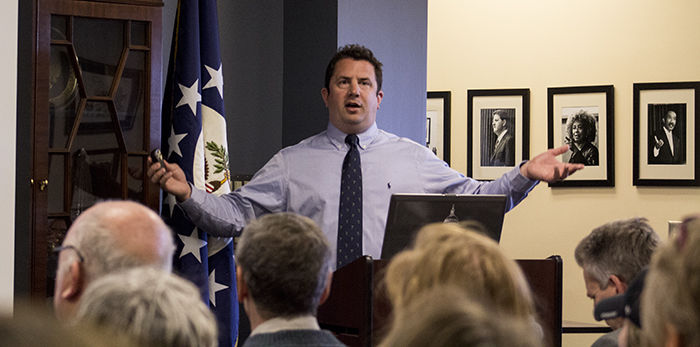Conspiracy theories often come from losing parties
Joseph Uscinski talks about conspiracy theories in politics at WSU’s Foley Institute event on Monday.
February 7, 2017
After an election, the losing party tends to throw accusations and conspiracy theories at the party in power, a University of Miami associate political science professor said.
As part of its Coffee and Politics series on Monday, the Foley Institute hosted Joseph Uscinski, who talked about conspiracy theories and why many people believe in them.
A recent poll showed 60 percent of Americans believe some sort of fraud was involved when their candidate doesn’t win an election, he said.
When Barack Obama won the presidential election in 2008, Uscinski said Republicans accused Democrats of registering unqualified voters. After Donald Trump won the election this year, many Democrats claimed the Russians had hacked the system.
Even in elections, Uscinski said candidates use conspiracy theories to gain support. Bernie Sanders ran on his one-percent theory, while Trump said there was a political elite focused on foreign interests rather than those of the U.S., he said.
Both were outsiders to the parties they ran for, Uscinski said; Sanders is a democratic socialist, and Trump is not a politician.
“There’s a strategy to (conspiracy theories),” Uscinski said. “They can actually be very good for your group if you’re on the outside.”
He said many conspiracies are real, but it is hard for people to determine which are true and which are phony.
Uscinski listed examples of real conspiracies, such as Watergate, the Iran-Contra affair and the Tuskegee experiment, in which the U.S. Public Health Service studied syphilis in a group of 600 men over 40 years while falsely claiming to be treating their diseases.
“Power does get abused by the people who have it from time to time,” he said. “Democracy requires that people be vigilant and keep an eye on people that have power, and we view them with skepticism.”
A conspiracy theory is an explanation for events that involves a secret group working against the common good, Uscinski said. They are hard to prove and are unaccepted by appropriate authorities.
Uscinski said conspiracy theories can actually be dangerous. If enough people believe in a theory, he said it can lead politicians to act on them, such as those who believe climate change is a hoax.
Another example of a dangerous conspiracy theory was when people were burned alive for being witches after Pope Innocent VIII declared witchcraft to be real in 1484.
The usual image that pops into people’s heads when they think of conspiracy theorists is probably middle-aged, white men with far-right political leanings. But everyone is inclined to believe in conspiracy theories, Uscinski said.
“To one degree or another, people are predisposed to viewing events and circumstances as a product of conspiracies,” Uscinski said.
Uscinski said that in his studies, he found that both the Republican and Democratic parties are equally inclined to believe in conspiracy theories, and race and gender are not determining factors. Indicators for someone believing in theories include education, income and whether the person belongs to a third party.
Sixty percent of Americans believe the Kennedy assassination was some sort of conspiracy, he said.
Twenty-five percent believe Obama was born outside the U.S., 20 percent believe officials are withholding facts about vaccines and four percent believe a reptilian elite is controlling the functions of the world’s governments, he said.
People usually blame political extremism, racism, cognitive shortcuts or the internet for many of these theories, but Uscinski said he believes it has more to do with socialization and partisanship.
People get trapped in their own spheres of information that they agree with and automatically reject anything with which they don’t agree, he said.
“You can reason anything away you don’t like,” Uscinski said.





















